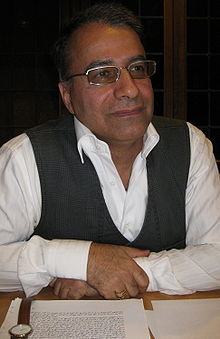Amir Hassan Cheheltan
Amir Hassan Cheheltan ( Persian امیرحسن چهلتن; * 1956 in Tehran ) is a Persian engineer and writer .
Life
Amir Hassan Cheheltan was born in Tehran. He completed a degree in electrical engineering, which he completed in the UK. Cheheltan has been a writer since the 1970s. His first volume of short stories, Ehefrau auf Zeit , was published in 1976. At the silent window in 1979 was his breakthrough as a writer.
Cheheltan was a soldier during the First Gulf War . In 1998 his name was on a list of ostracized writers. With a grant from the International Writers' Union , he went to Italy with his wife and son for two years in the spring of 1999 and worked as Writer in Residence in Certaldo . During this time he wrote Tehran, City Without a Sky .
Cheheltan writes scripts , such as the script for Cut! Prohibited Zone (2004). He writes essays that have been appearing in German media since 2004. In it he speaks u. a. of what the government tries to keep quiet: the teasing of the writers and the growing inequality in his home country.
The novel Iranian Dawn (2007, in German translation under the title Iranian Dawn ) was a great success in Iran and was nominated for the State Book Prize. Cheheltan protested against the nomination because of the censorship and publication bans in Iran. To this day, his writing - like that of all non-regime-compliant writers - has been hampered by the authorities' “differentiation between good and evil” (i.e. by censorship). From 2001 to 2004 he was a member of the board of directors of the Iranian Writers' Union.
The Munich publisher P. Kirchheim became aware of Cheheltan through his publications in German media and published the novel Teheran Revolutionsstraße 2009 as the world's first publication in German in a translation by Susanne Baghestani. The novel has not yet been published in Farsi. The Frankfurter Allgemeine Zeitung wrote: “If the re-sworn President Ahmedineschad were serious with his announcement to put a stop to arbitrariness and corruption and to restore real Islamic morality, he would have to allow the publication of such a book immediately. Instead, it is now appearing in German for the first time (...), and is world literature before it was anything else at all. "
In 2009/2010, Amir Hassan Cheheltan lived with his wife and son in Berlin thanks to a one-year literature scholarship from the DAAD . Since then, Cheheltan has lived in Tehran again.
Cheheltan is a juror for the award of Sadegh Hedayat- - literary prize .
Books (selection)
- Tehran Revolution Street, translated by Susanne Baghestani. Kirchheim, Munich 2009, ISBN 978-3-87410-111-0 .
- Americans kill in Tehran. A novel about hatred in six episodes , translated by Susanne Baghestani and Kurt Scharf. CH Beck, Munich 2011, ISBN 978-3-406-62160-4 (with the express reference to the title: “German edition, for the first time unabridged and without regard to the Iranian censorship”).
- Tehran, city without a sky. A chronology of nightmare and death , translated by Kurt Scharf. CH Beck, Munich 2012, ISBN 978-3-406-63943-2 . New edition 2015: ISBN 978-3-406-68584-2 .
- Iranian twilight , translated by Jutta Himmelreich and Farsin Banki. Kirchheim, Munich 2015, ISBN 978-3-87410-135-6 .
- The calligrapher of Isfahan , translated by Kurt Scharf. CH Beck, Munich 2015, ISBN 978-3-406-68345-9 .
- The steadfast parrot. Memories of Tehran 1979 , translated by Jutta Himmelreich, Berlin 2018, ISBN 978-3-95757-480-0 .
Awards (selection)
- 2020: International Literature Prize - House of World Cultures for The Circle of Literature Lovers
literature
- Amir Hassan Cheheltan
- نگاهی به رمان “سپیدهدم ایرانی” نوشتهی ( Memento from April 20, 2007 in the Internet Archive ) امیرحسن چهلتن (Persian)
Web links
- Amir Hassan Cheheltan
- Tehran is waiting for the great quake
- Portrait Amir Hassan Cheheltan: Love-hate Tehran
- "Iranians love the USA" . In: the daily newspaper online from May 23, 2012 - Interview with Amir Hassan Cheheltan
- Amir Hassan Cheheltan: "Tehran, City Without Heaven" , review of the German edition, October 2012
Individual evidence
- ↑ a b Amir Hassan Cheheltan: Who turns into a criminal just by reading a novel? The equality promises of Shiite Islam - and the new class of the Persian super-rich with their Porsches and private jets . In: Frankfurter Allgemeine Zeitung, May 17, 2016, p. 15.
- ↑ Amir Hassan Cheheltan: Writing is a dangerous thing. Iranian novels are only allowed to be set indoors - but without bed and bath. There is no copyright because censorship rules . In: Frankfurter Allgemeine Zeitung, April 7, 2015, p. 15.
- ^ Stefan Weidner: Fatherless Society . In: Frankfurter Allgemeine Zeitung of October 13, 2009.
- ↑ Verena Lueken : Innocence and mass grave In: Frankfurter Allgemeine Zeitung of August 12, 2009.
- ↑ The International Literature Prize goes to six authors. In: ORF.at . June 4, 2020, accessed June 4, 2020 .
| personal data | |
|---|---|
| SURNAME | Cheheltan, Amir Hassan |
| BRIEF DESCRIPTION | Persian writer |
| DATE OF BIRTH | 1956 |
| PLACE OF BIRTH | Tehran |
